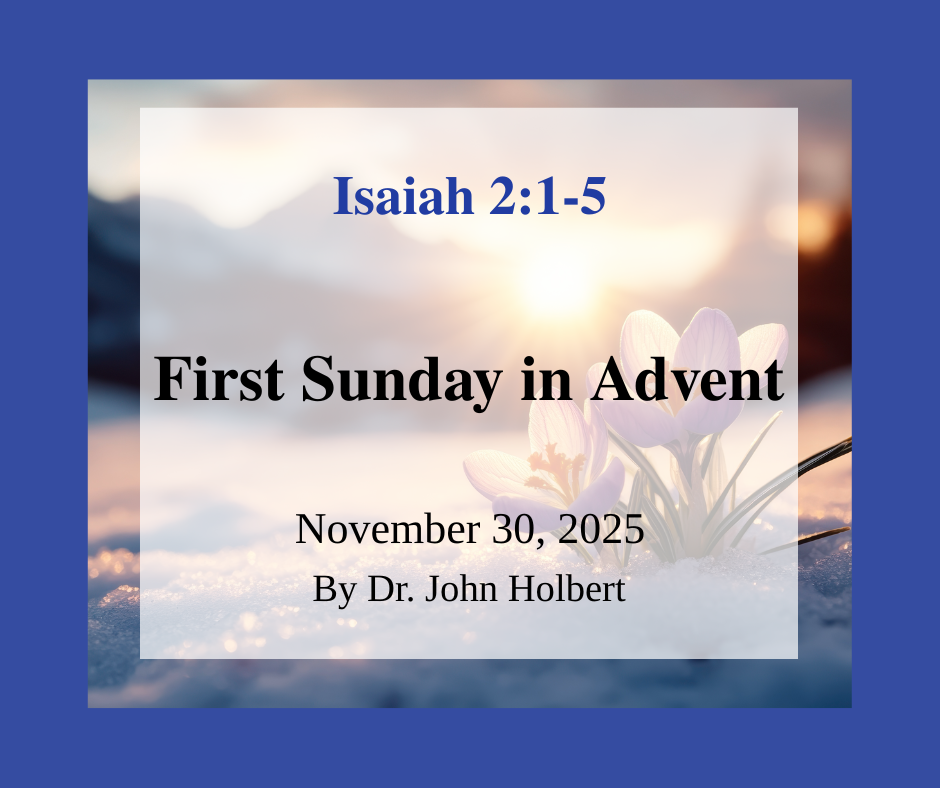Reflections on Isaiah 2:1-5, First Sunday of Advent, Year A
by John C. Holbert on Thursday, October 9, 2025

Today begins our journey through Year A, examining the lectionary texts assigned by the Committee on the Common Lectionary. I have navigated these texts, with slight changes through the years, many times for various organizations. What I find remarkable, as I imagine you do also, is the continual relevance of these ancient texts for our fast-changing modern contexts. Our current time presents us all with challenges that make gospel preaching especially important, as we confront authoritarian attempts to usurp both our constitutional freedoms and our free exercise of the inclusive gospel of God over against those who would spread a message of hate and exclusion throughout our land and world. We can disagree about many details of what constitutes the Gospel of Jesus, but what we cannot fail to announce week by week is that ALL are made in God’s image, and that God’s central claim is love for all creation. No preacher may be called a preacher called by this God if they do not place that central claim at the heart of every message. As we journey together, may we all strive to focus our words on that wonderful and unchangeable reality.
And to begin that announcement, we start with the language of Isaiah 2. The words are familiar, but perhaps the context is less so. In this fabulous passage, we see more than just a clichéd metaphor, a sentence made well known especially on the United Nations building in New York City: “They shall pound their swords into plows, their spears into pruning shears; nation shall not rise against nation with sword, and will not any more learn war” (Is.2:4). It is a noble sentiment, repeated again and again by those whose hopes are too often dashed by the stark realities of too many wars, too many swords, too much hatred and strife among peoples and nations. Just last week (Sept.26), Benjamin Netanyahu, Prime Minister of Israel, rose to address the representative assembly of 160 nations in this very building, and tried to convince them that his propagation of war against the Palestinians, and his sworn enemies Hamas, in the Gaza Strip was somehow justified. In response, huge numbers of delegates walked out, refusing to give him any sort of legitimacy. They believed that his so-called justified war was in fact nothing short of genocide, when the Israeli army has killed untold numbers of innocent Palestinian civilians while supposedly attacking military targets only. No more ironic scene could be imagined with that Isaianic passage looming just outside the assembly hall.
“House of Jacob, come, let us walk in the light of YHWH” (Is.2:5). Here the prophet recalls one of the earliest actions of YHWH in the world’s creation; “Let there be light,” says God,” and there was light” (Gen.1:3). After all that Israel has suffered since that announcement, the centuries of slavery, injustice, evil, idolatry, this light of YHWH continues to shine, and still bids those who will to walk in its brightness. Only in that light, says Isaiah, may we find true hope and true peace.
I have long wondered whether a single word in vs.1 might have been unfortunately overlooked as we assess this text. “The word that Isaiah, son of Amoz, envisioned (NRSV “saw”) concerning Judah and Jerusalem.” The simple translation “saw” is not quite what the word means. Chazah is a word from the world of mystery and wonder. It means “to envision,” “to imagine,” to discern not merely with the human eye but with the organ of fancy and surmise. There is wonder and beauty here, not only brute fact. Isaiah “envisions” the actions of YHWH, he does not only see them, and in that envisioning he sees hope and possibility. Swords may indeed be pounded into plows and spears into shears in the wondrous work of YHWH, a work far beyond what we humans may see with our limited scope.
And as we enter another Advent, we bring with us such a vision, such a hope, such a wonder that this year we will, in the face of all darkness and despair, find light, the light of God, the light of Jesus whose birth we soon will celebrate once again. When we are surrounded by language of hate and division, by horrifying and near-constant violent death by gunfire, we envision another way, a way of light and hope. May our Advent celebration contain the mystery of vision, a vision of God’s light for all that we may walk in that light once again and forever.
